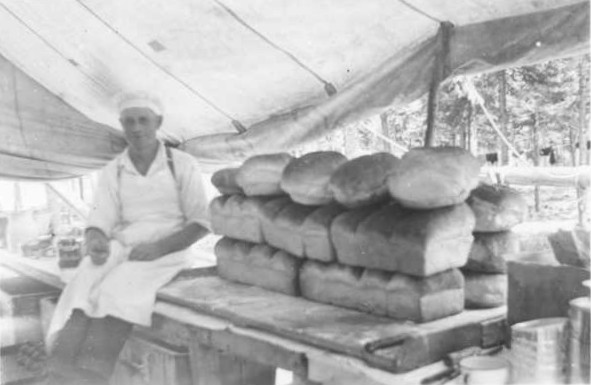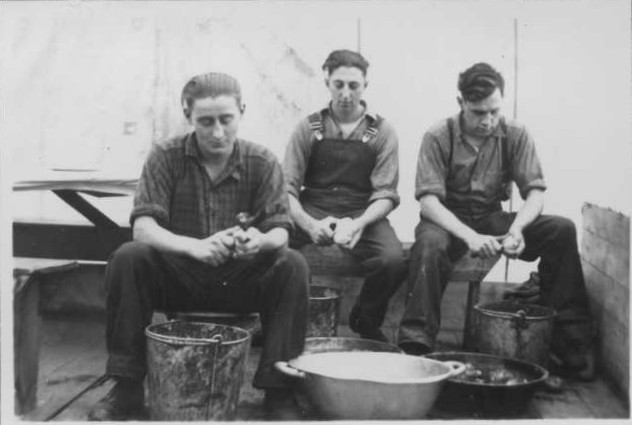Page
1 | Page 2 | Page
3 | Page 4 | Page
5 | Page 6 | Back to Life at Camp Page
One
cook at camp had certain specialties, but meat wasn't one of them.
“The
hills were not far from camp, so we went home for every lunch
at 12:00. The food was a problem. The potatoes were sometimes
burned, but maybe not too bad. But the meat was just impossible.
It was so tough no knife would cut it, let along trying to chew
it. The potatoes had no gravy, as I was used to. But I buttered
them so they would slide down better. What I ate most was bread
and butter, which was good, plus a piece of pie that was always
good. The cook was maybe more of a pastry man or baker than anything
else.” [ASM, 75-93]
Meat
that tough sounds hard to believe, but Peter A. Thiessen has the
scars to prove it.
“Bill
Cripps from Norgate, MB was our cook. He was a good cook. A few
boys had to help him in the kitchen making meals and washing dishes
for 70 heads. Bill made good pancakes for breakfast. He called
them flapjacks. Some mornings we would have eggs instead of flapjacks.
He also made good pies. The steaks sometimes were very tough and
I broke my two front top teeth.” [ASM, 15-17]
But
even if the food wasn't always gourmet, most of the time it was
edible and nutritious. And every now and then, the COs got a special
treat.
 |
 |
| Baking bread for the COs |
Three COs peeling potatoes |
As
Jake Krueger mentioned, sugar was rationed. Jacob W. Loeppky tells
the story of how one camp of COs got around that problem. The COs
had noticed a large number of bees around the camp, but didn't know
from where they were coming. One of the COs had worked with bees
before, so he created a honey-burning apparatus to create an odour
to attract bees. He placed it in the woods near a creek.
“No
sooner did he sit down beside the creek, when the worker bees
came to load up on easy pickings. With a paint brush Pete [the
honey worker] dabbed white paint on their wings. It took about
five minutes between trips, and Pete started walking in the direction
the bees flew. After the third trip he found a big cedar tree,
a hollow trunk where the bees were located. Robbing it produced
over a hundred pounds of honey. Sugar being rationed, we had lots
of honey for hot cakes in the morning after that.” [ASM,
225-226]
Page
1 | Page 2 | Page
3 | Page 4 | Page
5 | Page 6 | Back to Life at Camp Page |


